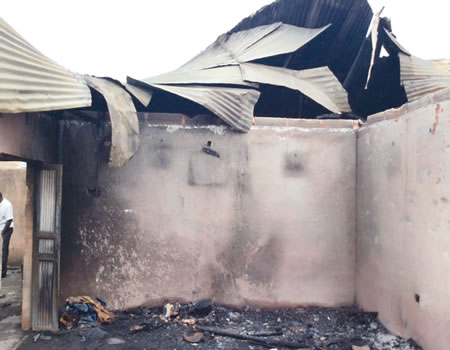Despite the perennial crises ravaging contiguous areas of Jos South, Riyom, Bassa and Barkin-Ladi council areas, Jos, the Plateau State capital had been largely shielded from any form of crisis in about eight years. So it came as a surprise when it was reported that gunmen attacked a community in the city recently killing several persons.
The line of divide which often created tension and crises in the city had since been removed and people had gone about their lawful duties unmolested, giving rise to the hope that peace had finally come to stay. But that hope had now been shattered with recent happenings.
Even as recent as Wednesday night, the killings had continued, as 19 persons were reported killed in Ariri community in Bassa Local Government Area of the state.
It all started penultimate Friday when news filtered out that some people, suspected to be Fulani herdsmen, attacked residents of Rukuba Road within the city, killing 14 people, nine of whom were members of the same family. The incident sparked a spontaneous protest from youths within the area who trooped out in their large number to protest the killings.
The protest which started on a peaceful note later snowballed into violence and confrontation with the security agencies and further spread to other parts of the city. In the scuffle that ensued, vehicles belonging to the Special Task Force otherwise called Operation Safe Haven, were burnt while several other vehicles including tricycles were damaged.
Within a short while, the development reignited ethnic and religious upheaval within the city, especially in Farin Gada, Gada Biu, Rikkos, Bauchi road, Nasarawa, Fraka, Tina Junction, Bauchi Ring road, among others. Those who had put the past behind them and resorted to normal life of peaceful coexistence suddenly descended on one another and went on a killing spree, destroying houses and properties in the process.
The situation assumed a more frightening dimension last Monday till the early hour of Tuesday when the affected communities within the state capital erupted in violence again, this time more intense in their fight against one another. In the attacks, several houses were burnt on both sides of the divide and people lost their lives.
Some residents alleged that fake soldiers in military uniform were seen moving from one point to another perpetrating the killing of innocent people. As result of the magnitude of the violence, a 24-hour curfew was imposed on the communities, enforced by security operatives. In spite of this, some miscreants still go about looting and burning down houses.
Mrs. Monica James, who was being treated at Our Lady of Apostle Hospital, told Sunday Tribune that she was at the vegetable market at Katako area of the city penultimate Sunday when she noticed that people were running helter-shelter. She also joined in running without really knowing the cause of the commotion.
According to her, she was unlucky to have chosen to run toward a wrong direction, as she was attacked with cutlass and other dangerous weapons by some youths. She was, however, lucky to have been rescued by security men who arrived the scene at the nick of time and took her to the hospital.
Another survivor, Ali Abubakar, receiving treatment at the Plateau State Specialist Hospital, claimed he was shot by men of Operation Safe Haven adding that he could not tell if it was a case of stray bullet or that he was actually aimed at by the security men.
Anthony Chika, who is still receiving treatment at Bingham University Teaching Hospital, said he was caught up in the crisis while in transit at Bauchi Ring road when the riot broke out on that Friday. Narrating the events in pain on his hospital bed, Chika said all the passengers in the vehicle he was going in jumped out and fled in different directions.
According to him, he eventually ran into some of the rioters who asked him if he was a Muslim or Christian. He answered that he is a Christian.
“They brought their weapons out to kill me, but I refused to give up and struggled with them and in the process received several cuts on my body; they however abandoned me on sighting the police coming towards our direction,” he narrated.
Apart from this, the crisis which lasted three days had left many homes deserted and their occupants, including many others without any means of livelihood.
Ademola Babalola, who resided at Rikkos, said he escaped with his family of six when the rioters attacked his house. He was lucky to have escaped. The house which he moved into just three months ago was completely razed. There are several other people with similar tales of woe.
Some of the questions currently agitating the minds of public analysts and residents of Jos include: why this resurgence of violence after close to nine years of peace? How could such an innocuous incident have caused such widespread destruction?
The general impression is that residents of the state capital have put the ugly incidents of the past behind them and had agreed to live in peace and harmony.
Some of the stakeholders who spoke with Sunday Tribune expressed shock over the resurgence in spite of the existing peace building mechanism and the amiable inter-faith co-existence among the leaders and adherents of the two major religions.
The Publicity Secretary of the Jama’atu Nasril Islam in the state, who is also the Senior Special Adviser to the Plateau State Governor of Religious Affairs, Mallam Sani Mudi, said no one in Jos expected such kind of ugly situation to reoccur again considering the harmonious relationship among residents of the state.
“The outbreak shows we have relaxed on peace building process and had began to take things for granted. Before the latest incident we have reached a stage in Jos whereby we talk to each other but with what had happened we have to go back to the drawing board,” he said.
Mudi added that the level of distrust is now high, while tasking leaders of various communities in Jos to do what is right and collaborate with the peace building agency established by the state government to restore normalcy to the state capital.
Senator Jeremiah Useni in a statement said the outbreak of violence in Jos the state capital was a setback, noting that “the recent unrest in some parts of Jos North leaves one to wonder and ask questions if violence is the way to go: Does it bring development? If peace is the way to go, why won’t we all give it a chance for a better Plateau?
“For the citizens to be protected and to be prosperous, the government should be seen as being proactive in matters of security and to be protective of her people. The government should be proactive at all times to stopping reoccurrence of this evil menace. In a situation where government apparatus and the security agencies are allegedly seen to be aligning with a particular side of the divide is rather (a form of) injustice to humanity and it’s a call for the citizens to protect themselves which is not always the best.”
The President of Stefanos Foundation, Mark Lipido posited that people of Nigeria and Plateau State in particular need to ask and provide answer to the fundamental question of why uprising in Jos, when election is approaching. According to him, the recent violence experienced in the city was orchestrated by some elements outside the state to intimidate the people of the state for political control.
He enjoined the people of the state to be vigilant adding that the recent upsurge of violence against the natives from various flanks of the state was not ordinary, more so that they are happening close to the next general election. He added that it is an act of intimidation and process of coercing the people to submission.
Some political analysts who spoke with Sunday Tribune said crises in Jos are always political in nature and often happen close to election time. According to them, the sudden resurgence of violence in the city is as a result of an upsurge in political activities, especially the local government election slated for October 10 this year and the general elections next year. There is also the belief that the violence could be linked to the high rate of cultism within the Jos metropolis.
Addressing newsmen, Commander, Operation Safe Haven, Major-General Augustine Agundu said cultism was now a real issue in Plateau State, especially in Jos, adding that this was as a result of rising cases of the use of hard drugs.
Mr Lipido of Stefanos Foundation is however of the opinion that the state government and the security agencies should always be on the alert and monitor activities of undesirable elements in the state who are always quick to visit mayhem on the society at the slightest opportunity to achieve their selfish political desire.
As the number of victims of the latest crisis continues to mount, no one is really sure what the motives of its instigators are. Could it be politics, or a continuation of earlier clashes now resulting in vendetta or revenge? But if what the analysts claimed that things like that often happen close to election period could be taken as a likely source of the problem, then the onus is on the authorities to get to the roots of the matter to unveil the faces behind the crisis and end the killings.







